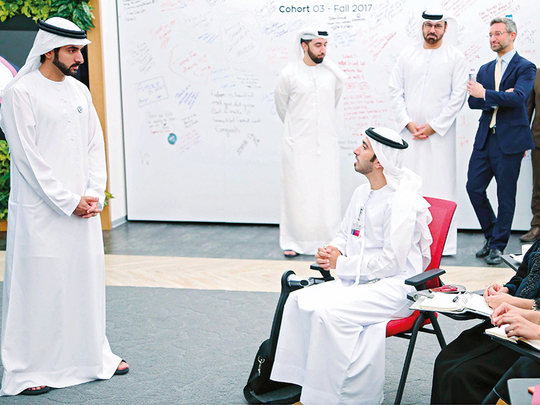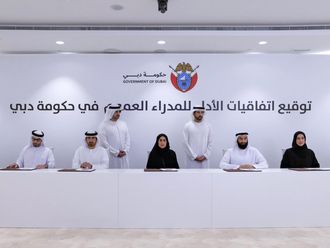
Dubai: The fourth edition of Dubai Future Accelerators (DFA) has been launched with the participation of 12 government bodies and in cooperation with the world’s most innovative companies.
Running for nine weeks, this year’s edition will consist of eight stages that will eventually activate networking and collaboration between 12 government agencies and partners from other sectors.
The programme will also provide a series of specialised workshops, office meetings with mentors and distinguished experts, and various cultural programmes and events.
While visiting Dubai Future Accelerator Headquarters at Emirates Towers on Saturday, Shaikh Hamdan Bin Mohammad Bin Rashid Al Maktoum, Crown Prince of Dubai and Chairman of the Board of Trustees of Dubai Future Foundation, launched the 4th Dubai Future Accelerators (DFA) and was briefed on various challenges that 12 government entities will work on to overcome.
“Dubai is a global role model for government of the future. It adopts exceptional work methods that surmount challenges facing major sectors, devises appropriate solutions and continues to build cooperation bridges with leading companies of the private sector to turn these concepts into projects that serve the development process,” Shaikh Hamdan said.
“Today, I reviewed what has been accomplished so far in our progress towards making the future. We are very proud of the results and the great projects that we realised in a record time (through the three previous editions) and we look forward to boosting them in the fourth one,” Shaikh Hamdan added.
“The Dubai Future Accelerators programme has established a work methodology for the future, developing solutions, speeding up their implementation, creating new mechanisms and providing a platform for initiatives, projects and ideas that will enable government agencies to anticipate challenges, find solutions and build effective partnerships with different sectors,” the Dubai Crown Prince said.
Shaikh Hamdan was accompanied by Mohammad Abdullah Al Gergawi, Minister of Cabinet Affairs and the Future and vice-chairman of the Board of Trustees and managing director of Dubai Future Foundation, and Khalfan Bel Houl, CEO of Dubai Future Accelerators, as well as shaikhs and senior officials.
Shaikh Hamdan was also briefed on the participating government bodies and the challenges that they will find optimal solutions for through making the most of the latest technologies and tools of the fourth industrial revolution.
The goals
Reduce violent crime rate: Through its participation in the 4th DFA, Dubai Police will work to bring down the violent crime rate by 25 per cent by 2021, using artificial intelligence (AI) and a set of software as well as databases.
Enhance safety levels: Dubai Municipality will work to find innovative solutions using AI to enhance safety levels in four key areas: early detection of pests threatening public health and effective control; the use of AI or modern techniques in identifying construction methods with an accuracy of up to 100 per cent; food safety management; and, finally, public health and safety management.
Raising health awareness: Through its participation, the Dubai Health Authority aims to heighten patients’ awareness on diseases and improve their awareness of self-protection measures using advanced technologies.
Sustainability of infrastructure: The Roads and Transport Authority (RTA) will work to identify the requirements for the sustainability and integration of infrastructure to test and operate self-driving and electric transport supported by advanced technologies such as wireless charging and vehicle communication systems. It will also work to create innovative systems for cyclists and pedestrians.
Dubai Electricity and Water Authority (Dewa) is also participating in the 4th DFA and will work to develop innovative solutions to improve the quality of current electricity and water supply services.
Telecommunication of the future: As part of its participation, Etisalat Digital will work to find innovative solutions to speed up the transformation of Etisalat’s operations into smart and digital services. It will also work to enrich customers’ experience to benefit from the augmented and virtual reality and AI during and after the provision of services.
Du will also work with a group of leading innovators to capitalise on the evolution of automated learning techniques and large data to improve the relationship with business customers by 30 per cent.
Smart Dubai Office will work to increase the adoption of government digital services by 25 per cent, and use the Internet of Things to manage inventory on the ERP (enterprise resource planning) system to save 30 per cent of the time and effort of employees.
Smart gates and Internet of Things to strengthen control:
The General Directorate of Residency and Foreigners Affairs aims to provide a seamless journey for travellers using smart gates, and to fully integrate AI into the process of travellers using these gates.
The Dubai Economic Department will also work to find technical solutions that adopt the Internet of Things to contribute to raising the work efficiency in the supervision and inspection field by 25 per cent by 2018.
The Knowledge and Human Development Authority (KHDA) will work to enable educational institutions that adopt smart systems to provide 21st century students with necessary skills and knowledge to prepare them for future careers.
Humanitarian acceleration: The Mohammad Bin Rashid Al Maktoum Global Initiatives will work to create and provide employment opportunities for refugees to contribute to improving their living standards and providing drinking water by finding solutions for the use of solar energy in desalination units.












